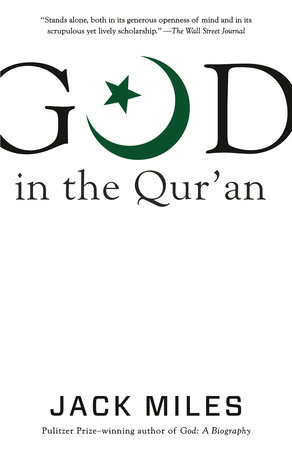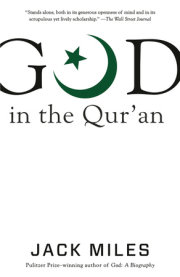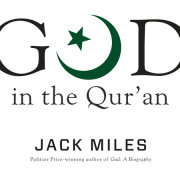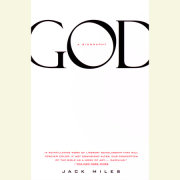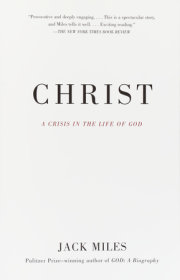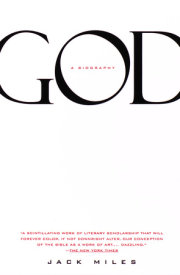Foreword Of God, Religion, and the Violence of Sacred Scripture Among all the books that have been written about God, I myself have written two: one about God in Jewish scripture and another about God in Christian scripture. The book before you—about God in Muslim scripture, the Qur’an—is the third in the series. I am a Christian, a practicing Episcopalian, but I approach God in all three of these books not directly but only through the respective scriptures of the three traditions. I write, moreover, not as a religious believer but only as a literary critic writing quite consciously for an audience crowded with unbelievers.
What this means is that I approach the scriptures not through belief but through a suspension of disbelief. Suspension of disbelief is a notion introduced into English literary criticism by the nineteenth-century poet and critic Samuel Taylor Coleridge. It is by the temporary suspension of disbelief that any of us is able to “let go” and enjoy a novel, a film, or a television series like
Game of Thrones on its own terms. When we go to the movies on a summer night and see a romantic comedy, we do not object as the film goes along that the lovers on screen are not real lovers but only two actors pretending to be in love. We disbelieve in their ultimate reality, of course, but for the duration of the film, we “allow” them to be real. We play along.
You can play along in the same way even when a literary character is divine. Not long ago, for a course I taught, I had occasion to re-read Homer’s
Iliad, this time in the wonderful Robert Fagles translation. The Greek god Zeus is a major character in that epic—the greatest of the Olympian gods. I do not belief that Zeus exists, but for the duration of my reading, I willingly played along with Homer, allowing Zeus to shape the course of the
Iliad as powerfully as he does.
As a Christian, by a kind of reversal, I can temporarily suspend my belief that the God of the Bible is indeed much more than a literary character and take him as no more than that for the duration of an exercise in literary appreciation. Just as I can go to St. Peter’s Basilica in Rome on a Sunday to worship and then go back on a Monday to study its art and architecture, so I can hear Christ’s Sermon on the Mount on Sunday as a part of my worship and then study it on Monday as relevant data about Christ as a literary character. The two exercises are different, deeply so, but they are not mutually exclusive and can be mutually stimulating.
Literary criticism, beginning in this way with the aesthetic experience of a work of literature, is different from literary history or historical criticism. Historical criticism is concerned with such questions as: Who wrote this work? When did he write it? Why did he write it? For what audience did he write it? Or did she write it? Or they? Was it originally in the language in which we now read it? What sources did they draw on, if any, as they wrote it, or is it truly an original creation? Has it been revised over time? Is it in circulation in more than one form? If so, which form is best? Is it perhaps the redacted combination of more than one version of itself? What has been its reception over time? Has it been translated? Has it ever been suppressed?
And so forth. Such questions—legitimate as they are, fascinating as they can be, and endless as they also are—are not the subject matter of this book. A scholar may have answered dozens of such questions about a given work of literature, indeed spent a lifetime answering them, without ever quite engaging the work in itself, as an aesthetic creation separable to some extent, as all great works are, from the time and place and circumstances in which it arose. Historical criticism need not interfere with literary appreciation, and the two can often be symbiotic, but the two are even then distinguishable.
In what follows, we will consider a cast of iconic characters who appear both in the Bible and in the Qur’an through an ongoing comparison whose focus at every point will be on God as the understood central character. Our modest goal will be a certain aesthetic appropriation not of the entire Bible or the entire Qur’an but just of these related passages within the two. My hope is that you will join me by whatever suspension of belief or disbelief works for you as I give primary consideration to Allah, God, as the overwhelmingly dominant central figure in the passages from the Qur’an.
Over the centuries, the view most often taken of the Qur’an by Jews and Christians alike has been the view classically taken by Jews of the New Testament—namely, “What’s true is not new, and what’s new is not true.” Non-Muslims have disbelieved and dismissed what Muslims believe of the Qur’an—namely, that it is God’s last word to mankind, the crown of revelation, restoring what Jews and Christians had lost from or suppressed in their scriptures by oblivion or corruption. My invitation here to Jews and Christians and the many others who disbelieve that bold Muslim claim is that, as a modest exercise in literary appreciation, they temporarily suspend their disbelief while together we attempt an engagement with God as the central character of the Qur’an, and with the Qur’an as an elusively powerful work of literature. My invitation to Muslims is that just as they might pray in a mosque on Friday but study its dome as students of architecture on a Tuesday, so they too might play along with this “Tuesday exercise,” this literary engagement with just a few selections from the Qur’an, read in conjunction with matching passages from the Bible. Honoring the Holy Qur’an in this way, as literature, is a way to open it, with sympathy, to new readers.
In the first of my books on God,
God: A Biography, I wrote about God as he instructed Israel to remember him:
In times to come, when your son asks you, “What is the meaning of the decrees and laws and customs that Yahweh our God has laid down for you?” you shall tell your son, “Once we were Pharaoh’s slaves in Egypt, and Yahweh brought us out of Egypt by his mighty hand. Before our eyes Yahweh worked great and terrible signs and wonders against Egypt, against Pharaoh and all in his House. And he brought us out from there to lead us into the land he swore to our fathers he would give to us. And Yahweh commanded us to observe all these laws and to fear Yahweh our God so as to be happy for ever and to live, as he has granted us to do until now.” (Deuteronomy 6:20-24) This was the Yahweh who—as “the lord” in most translations—is the initially invincible protagonist of the Tanakh or Jewish Bible, which became, as included in the Christian Bible, the Old Testament. Yet in the Tanakh, after Yahweh’s encounter with Job, he falls strangely silent: he never speaks again, and it seems that Israel comes to count decreasingly on His “mighty hand.” He is remembered with gratitude and devotion, to be sure, but his power becomes a distant future hope rather than a compelling present reality.
In my second God book,
Christ: A Crisis in the Life of God, I wrote about God as Yahweh the Jew—the God of the Jews returning to action as a Jew himself:
In the beginning was the Word: The Word was with God And the Word was God. (John 1:1) And then the stunning claim:
The Word became flesh, he lived among us, and we saw his glory, the glory that he has from the Father as only Son of the Father, full of grace and truth. (John 1:14) This claim stunning was stunning less for any arcane metaphysical reason, I argued, than for the fact that this divine Jew, confronted with Caesar as the new Pharaoh, does not, as of old, crush the brutal Roman oppressor with mighty hand and outstretched arm but instead goes meekly to His own Roman crucifixion. Yes, Jesus rises from the tomb, and his followers take his resurrection as the promise of eternal life, and yet Caesar is still Caesar, and in a few decades will destroy the Jerusalem Temple and send God’s people into exile and mass enslavement. If this is victory, the terms have changed so radically as to signal a crisis in the life of God.
But as this book is to be about God in the Qur’an, why am I not talking about Allah—God in the Qur’an—from the first sentence? Why trouble to say even this much about God in those earlier scriptures?
I do so because I undertook this book in early 2017 in the aftermath of an American presidential election heavily impacted by continuing “jihadi” attacks all over the world. Throughout that electoral campaign, fear of further such attacks had been intensely on American minds. During the Republican National Convention in 2016, one prime-time speaker evoked that fear as follows:
On Monday, an Afghan refugee in Germany used an ax and knives to slash and wound train passengers while shouting “Allahu akbar.” Last week, ISIS claimed responsibility after a Tunisian man drove a cargo truck into a crowd in Nice, France. He murdered eighty-four people including ten children, three Americans, and injured over 300 others. Two weeks ago, almost 300 people were killed and more than 200 were wounded in bombing attacks in Baghdad. Last month, a radical Islamist in Paris stalked a French police officer to his home where he murdered the officer, tortured his wife to death in front of their three-year-old son, while streaming it all on social media. He was pondering out loud whether to kill the 3-year-old when he was killed by police. Two days before that, an attacker pledging allegiance to ISIS killed forty-nine people in an Orlando nightclub, and wounded dozens more. All this in just the past thirty-seven days. We cannot let ourselves grow numb to these accumulating atrocities. One analysis estimated that since January 2015 some 30,000 people have been killed at the hands of terrorists.Newt Gingrich, who spoke these words, was sadly mistaken in believing that electing Donald J. Trump, the Republican nominee, to the American presidency could bring such violence under peaceful control. Trump was elected, but more than a year later, on November 24, 2017, gunmen carrying the black flag of the Islamic State killed more than 300 worshippers at the Bir al-Abed Sufi mosque in Egypt. Gingrich was not inventing the atrocities that he recited, nor was he mistaken in claiming that the Muslim terrorists who perpetrate atrocities like the Bir al-Abed slaughter (it should be said that many more Muslims than non-Muslims have died at the hands of such terrorists) do invoke Islam as justification and motivation, however repugnant their doing so may be to other Muslims. An American writing about the Qur’an, which is the foundation of Islam, could scarcely ignore the fact that all this was in the air or that there are passages in the Qur’an that lend themselves to such terrifying use.
Before this book comes to its conclusion, we may have visited a couple of those passages, but we have some important preliminary work to do. While I would not care to defend the claim that Islam is a “religion of peace,” neither would I defend the same claim for Christianity or Judaism. I do not deny that true religious pacifism has existed at times and still exists in a few places, but not one of these three religions deserves that title. Moreover, to clear the air just a little, we need to consider in general terms the relationship between violence as espoused by a religious community,
any religious community, and violence as expressed in that community’s sacred scriptures. In particular, what sort of obligation, if any, does war, strife, or violence in Jewish and Christian scripture impose on either Jews or Christians?
Let me illustrate the complexity of that question for these two traditions by choosing two or three quotations from the scriptures of each, beginning with Christianity. Only then will we be ready to turn again to Islam.
The belief that Jesus is the Word Incarnate—the Word who was with God and who was God before the creation of the world—has been foundational in Christianity for centuries. This is, to be sure, the Christ of faith rather than the Jesus of history, but the faith has its history no less than Jesus does, and, historically, this belief has been central to it. In the Roman Catholicism of my boyhood, every celebration of the Mass ended with the first chapter of the Gospel of John—the very chapter that, quoted above, identifies Jesus as the Word Incarnate. These were the words that the devout Catholic, leaving morning Mass, was to hear last and take with him out into the world.
With that in mind, let us turn to the final appearance of the Incarnate Word of God in the New Testament. This appearance comes at the end of Chapter 19 of Revelation, the last book in the New Testament, where we read:
And now I saw heaven open, and a white horse appear; its rider was called Faithful and True; he is a judge with integrity, a warrior for justice. His eyes were flames of fire, and his head was crowned with many coronets; the name written on him was known only to himself, his cloak was soaked in blood. He is known by the name, The Word of God. Behind him, dressed in linen of dazzling white, rode the armies of heaven on white horses. From his mouth came a sharp sword to strike the pagans with; he is the one who will rule them with an iron scepter, and tread out the wine of Almighty God’s fierce anger. On his cloak and on his thigh there was a name written: The King of kings and the Lord of lords.
I saw an angel standing in the sun, and he shouted aloud to all the birds that were flying high overhead in the sky, “Come here. Gather together at the great feast that God is giving. There will be the flesh of kings for you, and the flesh of great generals and heroes, the flesh of horses and their riders and of all kinds of men, citizens and slaves, small and great.” (19:11-18)Here, near the end of the New Testament, is a picture of Christ as a warrior mounted on a white horse, His cloak drenched in blood, leading an army similarly mounted, ruling the world with an iron scepter, slaughtering His enemies, “the pagans,” with a miraculous sword, and summoning the vultures to feed on the flesh of their corpses. In the
New Jerusalem Bible translation just quoted, the italicized phrases all come from the Old Testament; their multiplication is designed to make this sanguinary passage seem the final victory of Good over Evil. And there are other allusions that could have been italicized. “The wine of Almighty God’s fierce anger,” for example, is an allusion to the Book of Isaiah 63:2-6, in which Yahweh answers as follows the rhetorical question “Why are your garments red / your clothes like someone treading the winepress?”
I have trodden the winepress alone; Of my people, not one was with me. So I trod them down in my anger, I trampled on them in my wrath. Their blood squirted over my garments And all my clothes are stained. For I have decided on a day of vengeance, My year of retribution has come. I looked: there was no one to help me; I was appalled but could find no supporter! Then my own arm came to my rescue and my own fury supported me. I crushed the peoples in my anger, I shattered them in my fury and sent their blood streaming to the ground. Is this Christianity? One possible answer is, Of course it’s Christianity.
It’s right there in the Bible! Moreover, if American Christianity is the Christianity in question, an extremely familiar anthem comes to mind—namely, the “Battle Hymn of the Republic,” whose opening stanza alludes to God’s trampling his enemies till their blood streams like juice from grapes trampled in a wine press:
Mine eyes have seen the glory of the coming of the Lord: He is trampling out the vintage where the grapes of wrath are stored; He hath loosed the fateful lightning of His terrible swift sword: His truth is marching on. The “terrible swift sword” of Julia Ward Howe’s Civil War battle song is the “sword to strike the pagans with” that comes out of the mouth of Christ in the passage quoted above from Revelation.
So, this sort of rhetoric has a Christian history, and even an American history. And yet if you know a Christian, can you not imagine him or her saying, “I don’t care whether all this is in the Bible! This ruthless man-on-a-horse is not the Jesus I believe in! This is not my religion!”
Which answer is correct? In theory, either is correct. A Christian Crusader determined to model himself on the Jesus of Revelation 19:11-21 could do so. Perhaps General William Tecumseh Sherman, marching through Georgia to the sea, felt empowered to do so. A Christian with an absolutist view about Christian scripture might feel himself obligated to do so even now. In practice, however, even if many Christians have thought this way in the past, fewer do so now. Most do not take so absolutist a view of Christian scripture as to regard themselves as remotely obligated to imitate Jesus the mounted mass killer. It would be a grievous mistake to regard Christians as a dangerous population because they honor such scripture as the Word of God. It would be a mistake to fear that any one among their number—
any one of them!—just might be led on from scripture to mass murder. What matters, in short, is never what any scripture says in the abstract but what those who honor it as scripture take concretely from it.
Copyright © 2018 by Jack Miles. All rights reserved. No part of this excerpt may be reproduced or reprinted without permission in writing from the publisher.

